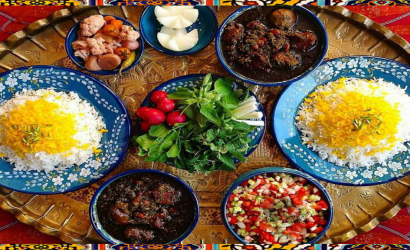Culinary tour
Food and dining has a public face in Iran, but its fullest development and greatest glories are to be found in the private setting of the home, among relatives and friends. Especially in social gatherings, the variety and abundance of foods, as well as the conviviality and generosity of the host, are remarkable. Sharing food is an important mechanism of socialization and social bonding.
A traditional proverb states that a way to win someone’s favor is to share your food with them: namakgir kardan , which means “having someone to have a taste of the salt in your food” (i.e., to become bound by hospitality).
Food is not an end itself but a means of family solidarity and social exchange, especially in the traditional world of the past when families were extended and eating was a communal affair within the extended family.
In general, culinary practices in Iran have been affected by several important cultural factors. The most obvious, of course, are the requirements of Islamic dietary law since the vast majority of the population are Muslims: meat should come from animals that have been ritually slaughtered; pork and certain other foods are forbidden; and wine or other alcoholic beverages, though certainly used by some people at various times, are illegal under Islamic law and have been strictly prohibited since the establishment of the Islamic Republic.
Come Iran, Taste our culinary food and Enjoy well.

- Jan
- Feb
- Mar
- Apr
- May
- Jun
- Jul
- Aug
- Sep
- Oct
- Nov
- Dec

- Jan
- Feb
- Mar
- Apr
- May
- Jun
- Jul
- Aug
- Sep
- Oct
- Nov
- Dec
